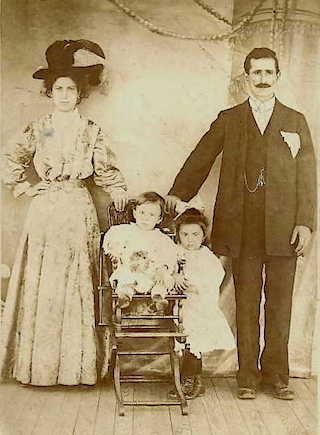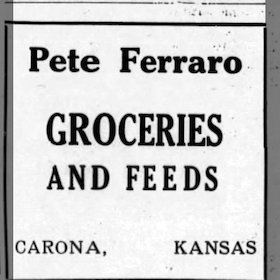
History's Hidden Gems
More News Articles
by Holly Swigart

The Ferraro Family
by Holly Swigart December 16, 2021
Calabria, the toe of the boot, is a lovely area in southern Italy with plenty of beaches and scenic mountain vistas. Today it might be a vacation destination, but in 1901, thousands of people were trying to escape what had become a desperate situation. At that time, Italy was still a young nation struggling to bring together all of the kingdoms and city states, which had existed and operated in much the same way since the middle ages. Economic strife, outbreaks of disease and volcanic eruptions all contributed to the chaos. Farmers like Vito Ferraro and his wife, Saveria were especially hard hit, as were so many in Southern Italy. Their twenty three year old son, Pietro Ferraro was among the many immigrants who left for the United States in search of a better life. Kansas coal mines had become a beacon of hope for immigrants as a way to make a living, and Pietro Ferraro like thousands of others went to work in the mines. He settled in Carona, Kansas, alongside many of his countrymen who had also come to Southeast Kansas to find work in the coal mines. A few years later, Lauretta Vetero arrived from Italy, and she and Pietro were married in 1904. Pietro eventually became "Pete" and he and Lauretta had twelve children together. Carona was a community where many of the citizens spoke Italian, which made the transition for new arrivals much easier than it might have been in other places.
Coal mines in those days paid their workers in "Scrip," which could only be redeemed at the company store. Since the mining camps were usually built next to a mine, that put them in remote areas where there were no other stores. Prices at the company store were always higher than those at independent grocery stores, but transportation to larger towns wasn't easy, even if a person did have money to spend. Miners basically had no choice but to shop at the company store. While working for the coal mine, Pete Ferraro secured a position at the Company Store. Working there taught Pete a lot about how to operate a business. He became acquainted with the different suppliers and learned about every aspect of how to run a general store. After a few years, he was able to open his own store, independent of the mining company. Folks in town were finally able to buy goods at reasonable prices from local people who lived in their community instead of being forced to buy everything from the mining company which kept them forever in debt. The Ferraro Store was a boost to the local economy as well as a boost to morale giving people the freedom to shop somewhere besides the company store. They were able to save more of their hard earned money, thus creating, for the first time, the ability to get ahead financially.
The Ferraro Store became a social gathering place as well as a place of commerce. The store was used for a variety of events, including receptions and lodge meetings. Friends and neighbors would stop in just to visit and hear the local news. Most of the Italian immigrants who settled in Carona, had come from the same area of Italy, so some of the families may have had connections that reached back generations. All this helped foster a close knit community. That sense of community was very important to Pete Ferraro. Pete loved being involved in social events and wanted to expand the capacity for large gatherings. He found a partner, Frank Parise, and together they built a grand ballroom.
On a warm summer evening in June of 1934, the Gay Parita opened its doors for the first time and a brand new enterprise was born just down the road from Ferraro's original grocery store. Overnight, the small community of Carona became a hub of entertainment for the area, drawing crowds of five hundred people or more on any given night. The facility had a huge dance floor with a large elevated band stand at the back. There was a bar and a kitchen on the ground floor where food was served. Upstairs above the kitchen was an additional bar and small dance floor. Balconies on both sides, overlooking the main dance floor below, were lined with booths and tables. The Gay Parita was an overwhelming success right from the start. They were open every single night in the early days. A variety of popular events drew such large crowds that despite the building's size, there was often overflow into the parking lot. Carona became well known far and wide for its outstanding entertainment. There were vaudeville acts, boxing matches, bocce tournaments, community dances and performances by all sorts of famous musicians. There were traveling floor show acts with dancers and tumblers. Bands on tour from the Phillipines and Mexico came to the Gay Parita. Pittsburg's own Ernie Williamson Orchestra performed there frequently, and later on, Bob Wills and his Texas Playboys were regulars. The ballroom did a booming business throughout the thirties and forties up until World War II. When the United States entered the confilct in Europe, many of the patrons of the Gay Parita were off to war and no longer around to attend dances. The Ferraro family also answered the call of duty. Five of Pete Ferraro's sons joined the military. Pete managed to keep the business going during the war, but on a smaller scale. For the next couple of decades, there were still regular events at the Gay Parita, just not at the level it had seen before the war. The Gay Parita continued to provide a place for social gatherings, wedding receptions, and benefits to raise money for those in need.
After the war, Pete's son Joe came home to Carona and served as the local postmaster there. Joe also took over the Ferraro Grocery Store and kept it open until 1986 when he retired. The Ferraro family served the community well by providing groceries at fair prices. They served their country by joining the armed forces in a time of war, and they transformed a small mining community into a regional center for top notch entertainment. The Ferraro family legacy is truly a jewel of Southeast Kansas.